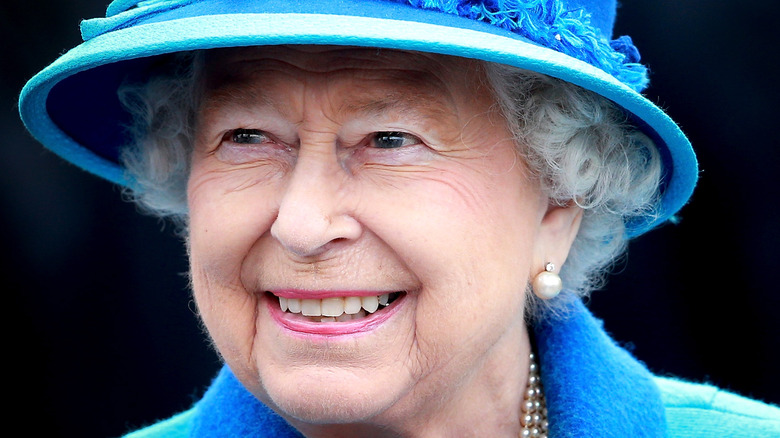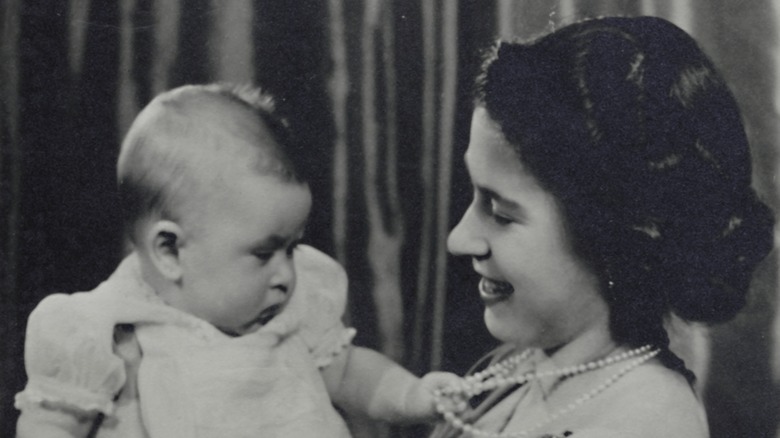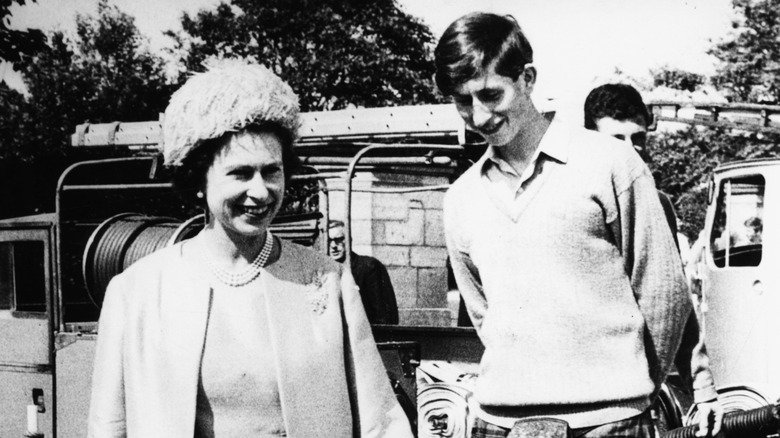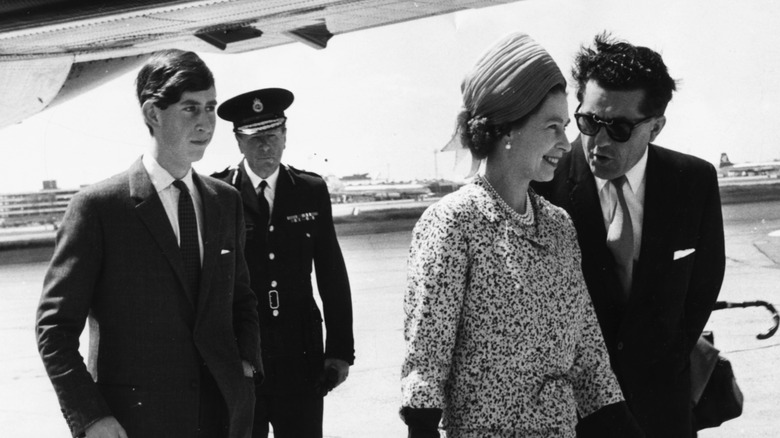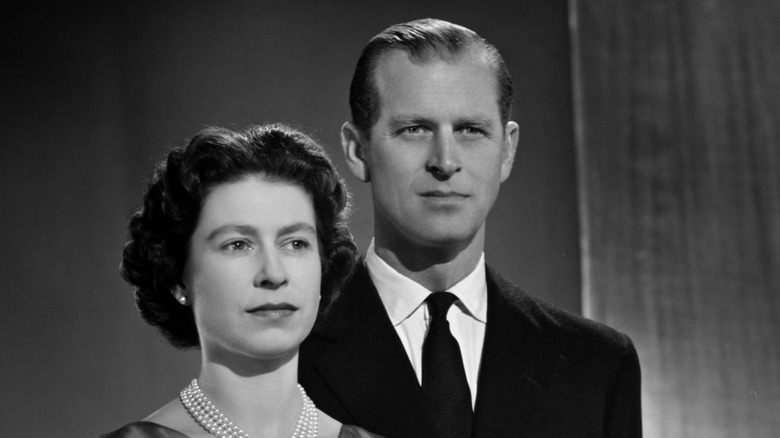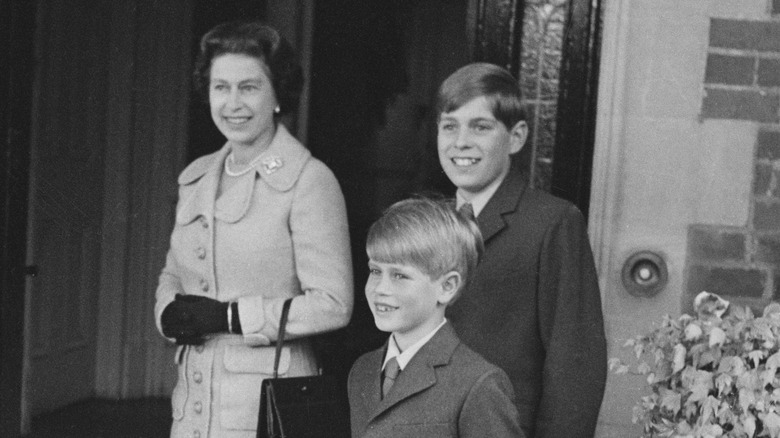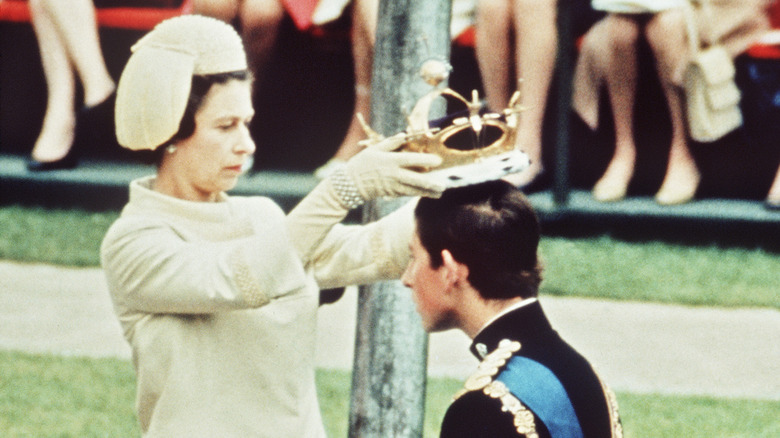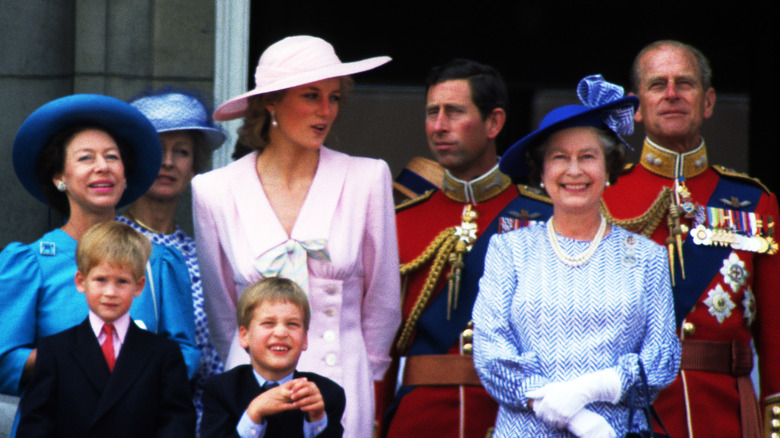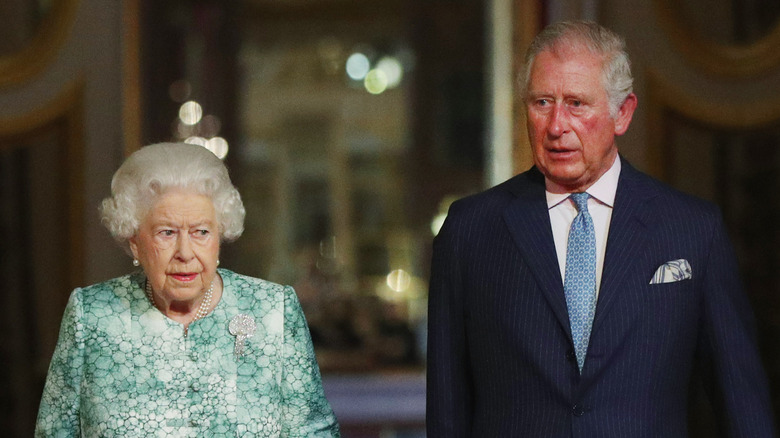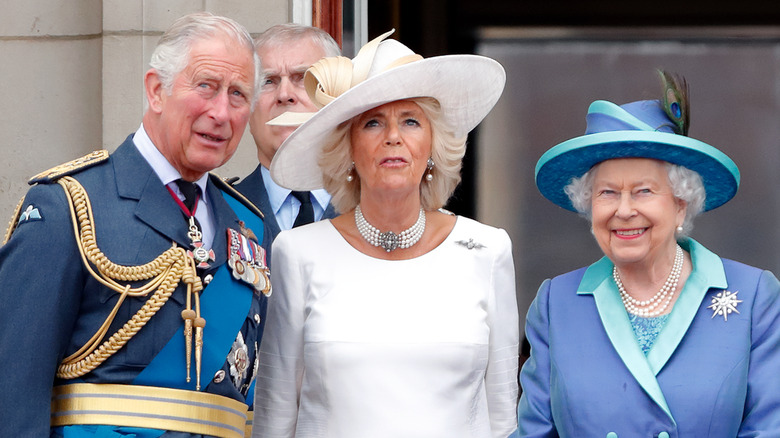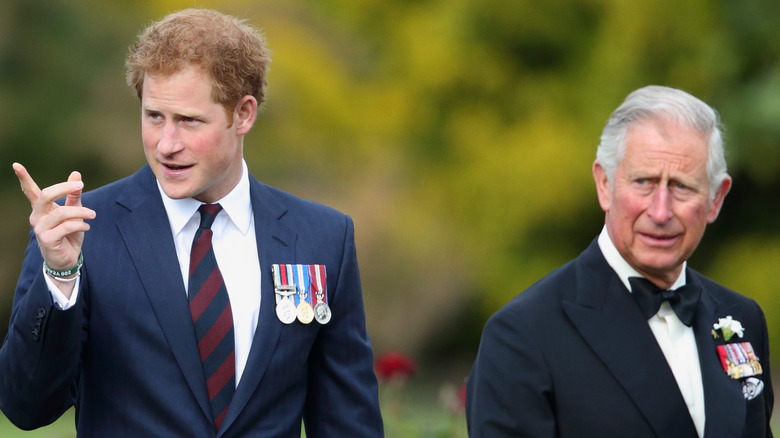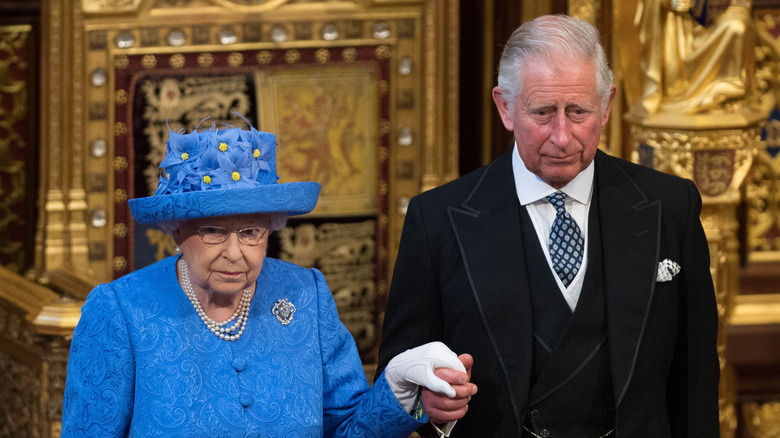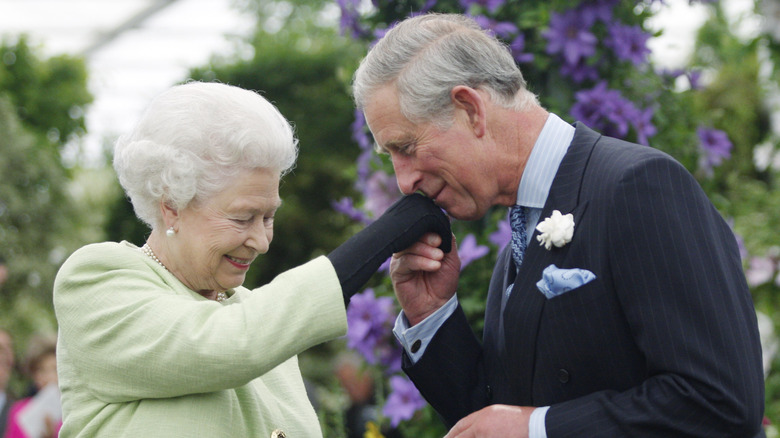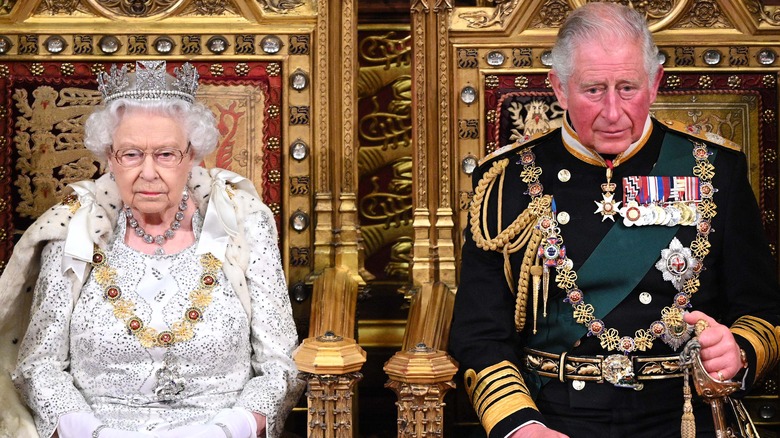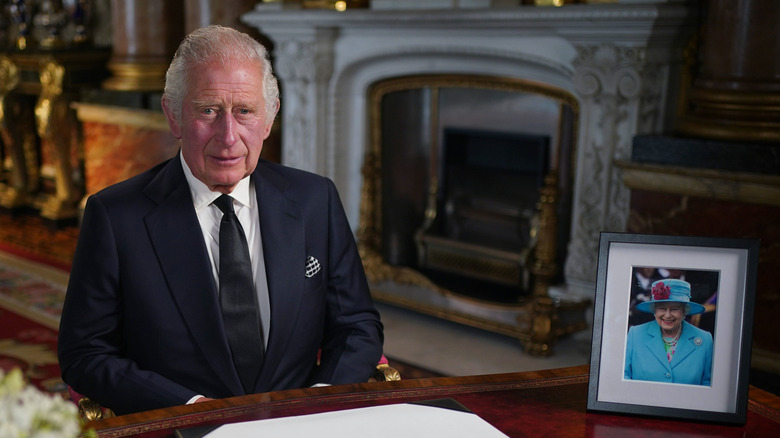The Truth About Queen Elizabeth's Relationship With King Charles
During her reign, there were reports that Queen Elizabeth II was frustrated with her son, then-Prince Charles. In the 2021 documentary "Queen Elizabeth: Love, Honor and Crown," a royal expert claimed that the queen felt as though Charles would "never live up to her sense of duty." The documentary, according to the Daily Mail, added that it was Prince Andrew, not Charles, who caught the queen's eye as the dynamic child. "To this day, she's more openly affectionate to Andrew and more forgiving toward Andrew than she is towards Charles," said royal biographer Clive Irving, according to the outlet.
When Queen Elizabeth died on September 8, 2022, it thrust Charles into the role he had been waiting for his entire life. Her funeral was filled with unforgettable moments, with family members and political leaders from all over the world coming together to pay their respects. There was, of course, loads of drama over Prince Harry and Meghan Markle's arrival in the United Kingdom after their exposé on the royal family with Oprah Winfrey. There was also a conspiracy that cameras deliberately blocked audiences' views of Meghan with a candle.
But it wasn't just Harry and Meghan who caused talk at the funeral. Camilla Parker Bowles wore significant jewelry to pay tribute to her late mother-in-law. But of all the people there, it was Charles who kept the attention because of his major change in rank, following in his mother's footsteps into the role of monarch. So, what's the backstory to Charles' relationship with his mother?
King Charles' childhood relationship with the queen
Queen Elizabeth II became a mother before she became queen. In 1948, when she was 22 years old, she gave birth to King Charles III, Hello! magazine noted, after enduring a 30-hour labor. As was the custom, Prince Philip was not in the room with her. As the report goes, Philip kept busy by playing squash. How he must have suffered!
Elizabeth had every intention of being a hands-on mother. Kitty Kelley wrote in her book "The Royals" that the queen insisted on a home birth. "I want my baby to be born in my own room, amongst the things I know," the monarch reportedly explained. She also had every intention of acting as her son's primary caregiver rather than relying on help, allegedly saying, "I am going to be the child's mother, not the nurses."
But other things seemingly got in the way. Kelley noted that it was Philip, and not baby Charles, who was the leading man in her life, and the future queen dashed off to be with him in Malta when he was stationed there with the navy, per Tatler. As such, Elizabeth reportedly didn't see Charles learn to walk. In fact, the baby's first word was apparently "Nana," a clear indication that he had bonded with his nanny more than his mother at that time. When Elizabeth became queen in 1952 at the age of 25, things drastically shifted in her relationship with her children, Charles and Anne, at that point, Kelley reported. Elizabeth ostensibly became a working mother, a rarity at the time.
Queen Elizabeth taught Charles how to ride
The late Queen Elizabeth II was so fond of horses that her equestrian passion ran through her from beginning to end. "It's very important to know that she was absolutely, wonderfully switched on," John Warren, the queen's horse racing manager, told Hello! magazine following her death. "She really loved having them right there [her family] with her and being able to talk about her horses and her love for her horses right to the very end."
Warren said that one of her horses had just won a race and this pleased her to no end. "On the Tuesday evening she was in really good form, delighted she had had a winner, and talked about the prime ministers coming in and out, and I can hardly believe it possible that within less than 48 hours the Queen had died," he added.
Her deep love of horses had a positive impact on the queen's relationship with then-Prince Charles. As Vanity Fair notes, the queen ensured that the future king knew how to ride properly, and she was the one to teach him. It became a solidifying bond between mother and son over the years. In 2021, Charles and now-Queen Consort Camilla joined Elizabeth at the Royal Ascot, according to The U.S. Sun, and everyone appeared in high spirits. Camilla, like the late queen, is also an avid breeder, creating a meaningful bond between the two women thanks to equestrian love.
King Charles was raised by nannies
It wasn't initially Queen Elizabeth II's plan to have the future King Charles III cared for by nannies. In fact, the queen was looking forward to doing away with aristocratic traditions and caring for her baby herself. Nothing was too much for Elizabeth when Charles was a newborn. As royal biographer Ingrid Seward wrote in "My Husband and I: The Inside Story of the Royal Marriage," Elizabeth reportedly breastfed Charles for the first month and kept him close, so he slept in her dressing room to be near her at night. A hiccup came when the queen contracted the measles and, for Charles' safety, the nanny, Helen Lightbody, and nursery maid, Mabel Anderson, took over the role of caring for the baby.
Things got even more complicated when Elizabeth unexpectedly became queen at only 25, following the death of her father, King George VI. "I think any idea of a family in the normal sense was knocked on the head by the queen's accession at such an early age," author Philip Ziegler explained to Kitty Kelley in her biography "The Royals." Elizabeth had no choice but to step up and accept her role. In many ways, she became a working mother long before it was culturally accepted, and suddenly she had to juggle royal demands and the needs of her young children. Seward said that much of the affection that Charles experienced ultimately came from his nannies, as he knew that he would get snuggles in the nursery with them.
She and Prince Philip left for a six-month Commonwealth tour
As royal demands continued to summon her, Queen Elizabeth II and Prince Philip left their children for six months to embark on a tour of the Commonwealth. The 1953 tour was so immense that many people wouldn't visit that many countries in the span of a lifetime. "So this will be a voyage right round the world — the first that a Queen of England has been privileged to make as Queen," Elizabeth said of the tour. "But what is really important to me is that I set out on this journey in order to see as much as possible of the people and countries of the Commonwealth and Empire."
As a monarch, the tour was a massive success, and it was clear that Elizabeth was kicking off her reign as an accessible queen. As a mother, the tour put some strain on her young children, King Charles III and Princess Anne, and what surprised many onlookers was the queen's undemonstrative reunion with her children. Biographer Kitty Kelley wrote in "The Royals" that Charles bolted on board the Britannia to greet his mother. "When the Queen saw her young son squirming in line, she said, 'No, not you, dear,'" Kelley wrote (via Vanity Fair). "She did not hug him or kiss him; she simply patted his shoulder and passed along to the next person." Apparently, any affectionate demonstration had to wait until the family was in private.
Did the queen prefer Prince Andrew?
Former Prince Charles and Princess Anne had a very different experience of Queen Elizabeth II as a mother than their two younger siblings did, Princes Andrew and Edward. For Charles and Anne, Elizabeth was still brand new to the role of monarch and was careful about getting it right. Charles recalled the vision of his mother in his childhood. "Mummy [was] a remote and glamorous figure who came to kiss you goodnight, smelling of lavender and dressed for dinner," he said, per Ingrid Stewart in her book "My Husband and I: The Inside Story of the Royal Marriage." Charles, being the eldest, was able to explain this to his younger sister. When Anne fussed about being taken away from their mother, Charles reportedly said, "Anne, you must not bother Mummy. She's busy. She's queening," as Kitty Kelley wrote in "The Royals."
However, as Elizabeth grew surer of herself as a monarch, she was able to relax as a mother. Prince Andrew came along in 1960, while Prince Edward was born in 1964. Since Elizabeth became queen in 1952, that was plenty of time to learn the juggling act. "In the 1960s, the Queen became a more relaxed and consistently engaged mother with her second set of children," royal biographer Sally Bedell Smith wrote in "Elizabeth the Queen: The Life of a Modern Monarch." Royal biographer Hugo Vickers told Page Six that the queen was much closer to Andrew and Edward. "She was able to dictate her time much better and spend more time with them," he said.
The one time Queen Elizabeth embarrassed King Charles
Queen Elizabeth II threw a curveball at then-Prince Charles when he was only nine years old. Charles was attending Cheam School, a preparatory school in Berkshire, about 60 miles from London. The young prince's experience of the school was a dark one. He was reportedly homesick and too sensitive and introverted to thrive in the environment at Cheam, a school his father, Prince Philip, had attended.
In an excerpt from her book "Prince Charles: The Passions and Paradoxes," Sally Bedell Smith shared with Vanity Fair that he also struggled with being bullied by his classmates. "As heir to the throne, he made an inviting target for school-mates, who ridiculed his protruding ears and called the pudgy prince 'fatty,'" Bedell Smith wrote. She also noted that the school used corporal punishment, something Charles found demoralizing. It certainly wasn't a homey atmosphere, and Charles' family seemingly knew how miserable he was. Bedell Smith said that the queen wrote to Prime Minister Anthony Eden, "Charles is just beginning to dread the return to school next week — so much worse for the second term."
So, with all of this as the backdrop, it was reportedly awkward and uncomfortable for Charles when Queen Elizabeth announced on TV in 1958 that he was to be the Prince of Wales, according to Express. The little lad apparently had no idea this was coming, and such an announcement only drew more attention to the unsuspecting — and unprepared — Charles.
The queen's complicated relationship with Charles and Diana
If things were complicated at times between Queen Elizabeth II and then-Prince Charles, things got even more intense when Princess Diana came into the picture. Early on, the relationship between the queen and Diana was reportedly stiff, Andrew Morton noted in his biography "Diana: Her True Story — In Her Own Words." "[Diana] kept the formal obsequies — dropping a deep curtsy each time they met — but otherwise kept her distance," Morton wrote.
However, Diana and the queen became closer as the former became more of a figure in the family. In Ingrid Seward's book "The Queen and Di," Seward said that the queen was very compassionate towards her daughter-in-law as Diana faced struggles. Prince Philip, on the other hand, seemingly had less patience with Diana and thought her difficulties were simply "emotional self-indulgence." That's not to say that the queen never got frustrated with Diana. Royal biographers Geoffrey Levy and Richard Kay told the Daily Mail that privately, the queen allegedly sometimes called Diana the "impossible girl," but understood too that being married to Charles was no simple task, especially with news surfacing that he was being unfaithful to Diana with Camilla Parker Bowles.
Ultimately, by the end of Diana and Charles' marriage, it was the queen who pushed for their divorce, the Los Angeles Times noted. Elizabeth was reportedly exasperated that Charles and Diana were so public about their marital unhappiness, and she thought it best that they just end it once and for all.
Queen Elizabeth found King Charles extravagant
Queen Elizabeth II and the formerly titled Prince Charles did not see eye-to-eye about thrift and frugality. It was an ongoing source of difference between the mother and son and was one that was discussed in the 2015 documentary "Serving the Royals: Inside the Firm." Royal butler Paul Burrell claimed of Charles, "His pajamas are pressed every morning, his shoelaces are pressed flat with an iron, the bath plug has to be in a certain position, and the water temperature has to be just tepid" (via the New York Post). According to Burrell, everything had to be done for Charles, down to toothpaste application on his toothbrush, and it has to be precisely one inch of toothpaste.
For someone like the queen, who loved time outdoors with her horses and dogs, Charles' glamorous side apparently struck her as excessive, royal biographer Giles Brandreth told The Telegraph in 2004 (via Express). Brandreth got the inside scoop from the queen's cousin, Margaret Rhodes, who said that Elizabeth was often baffled by Charles' taste. "The Queen finds Prince Charles very difficult," Rhodes allegedly told Brandreth. "He is extravagant and she doesn't like that."
Even Charles' breakfasts were reportedly high maintenance. Former staff chef Graham Newbould told the New York Post, "Wherever the prince goes in the world, the breakfast box goes with him. He has six different types of honey, some special mueslis, his dried fruit and anything that's a bit special that he is a bit fussy about." Not exactly the queen's way!
Tension between the two over Camilla Parker Bowles
There wasn't just tension between Queen Elizabeth II and then-Prince Charles about Camilla Parker Bowles — there was tension with the whole nation. Once it became public news that Charles had been unfaithful to Princess Diana, CNN noted, Britain stood with Diana. The vitriol against Charles and Camilla grew even more feverish when Diana died in 1997, and the queen observed all of this. Since Charles was the heir to the throne, it wasn't good for the royal family or the crown that he was attracting so much negativity on account of his love for Camilla.
As Charles continued to date Camilla, the queen seemingly made her displeasure evident when she refused to attend her son's 50th birthday, Express reported, because Camilla would be there. Royal commentator Peter Hunt explained to LBC News (via Express), that Elizabeth was worried that Charles' ongoing relationship with the future queen consort would compromise the monarchy.
However, as Charles refused to break up with Camilla, the queen eventually softened to the idea and, through the help of strategic planning of palace secretaries, decided that Charles and Camilla had to marry, per Vanity Fair. Choosing Windsor, they tied the knot in a civil ceremony in the town hall, followed by a blessing at St. George's Chapel. The queen did not attend the ceremony, Newsweek noted, because she was the head of the Church of England, but she did go to the blessing and the reception.
How Prince Harry created conflict between the queen and Charles
There was one thing that Queen Elizabeth II and then-Prince Charles felt in common in 2021: they were both deeply hurt by Prince Harry and Meghan Markle's interview with Oprah Winfrey. Royal sources alleged to the Daily Mail that the queen was devastated by Harry's comments about the royal family, making them look neglectful and unloving. She was reportedly especially troubled by what Harry said about Charles, implying that he was a disappointing father because of how he himself had been parented. Ouch!
But Charles and the queen did seemingly disagree about how they should respond to Harry and Meghan's shocking claims. Charles wanted the chance to thoroughly respond to everything that Harry said, according to royal expert Katie Nicholl, who spoke with ET. She claimed that Charles and Prince William were eager to respond in length. Instead, however, Buckingham Palace released a brief message on behalf of Queen Elizabeth.
"The whole family is saddened to learn the full extent of how challenging the last few years have been for Harry and Meghan," the palace statement read. "The issues raised, particularly that of race, are concerning. While some recollections may vary, they are taken very seriously and will be addressed by the family privately. Harry, Meghan and Archie will always be much loved family members." Brevity is the palace's trademark — and while Charles reportedly would have loved more, the queen stuck with this tradition, even under such unusual circumstances.
There was an emphasis on the royal family working as a team
In March 2021, royal expert Katie Nicholl weighed in on the previously mentioned rumors that suggested Queen Elizabeth and her son, then-Prince Charles, were at odds. She told ET that she was "not sure there's truth to the queen being frustrated with Prince Charles." In fact, Nicholl seemed to think that we were seeing quite the opposite. "I think in all of this, certainly over the past year, both as a result of the pandemic and as a result of Megxit, I think what you're seeing is a very closely aligned, top tier royals, the queen, Prince Charles, and Prince William, really working as a unit together. I think there isn't discord there. I think they're coming at this from the same place and working together as a team," she explained.
And this certainly wasn't the only time in more recent months that the public had heard the word "team" used to describe how the royal family operates. Royal expert Robert Jobson echoed that sentiment in a piece he wrote for Hello! magazine, according to the Mirror. "The royal family like to do things as a team, and if the team is being trashed they like to react as a unit and a family," Jobson wrote.
King Charles recognizes what the queen did for the country
Whatever King Charles III felt about his relationship with Queen Elizabeth II in his earlier years, age softened his opinion of her. Charles occasionally complained as an adult that his mother was cold and distant, but the queen's cousin, Margaret Rhodes, told the Daily Mail that Charles got it wrong. "In my opinion, Charles has been rather naïve," Rhodes said. "I remember when he and Anne were quite small and the Queen would take them away to Balmoral." Rhodes described beautiful family visits, where the queen cooked dinner and got her kids to help with chores, even washing the dishes. They got to be a normal family. "These were magical times full of fun and love. She was much closer to the children than Charles gives her credit for," Rhodes added.
But in June 2022, at the Platinum Jubilee, Charles took the stage to thank his mother and, based on his message, he had clearly changed his tune. "Your Majesty, Mummy," Charles began his speech, per Town & Country. "On behalf of us all, I wanted to pay my own tribute to your lifetime of selfless service," he went on, noting that she wasn't there for the celebrations. "You have met us and talked with us," Charles said. "You laugh and cry with us and, most importantly, you have been there for us, for these seventy years. You pledged to serve your whole life — you continue to deliver." It seems like Charles understood why she juggled so much as a mother.
How Queen Elizabeth paved the way for Charles to become king
For a period, there was speculation over the idea of Prince William taking over as king once Queen Elizabeth II died, instead of then-Prince Charles, the New York Post noted. William's appeal was that he was so much younger than Charles; on top of that, Charles' relationship with Camilla Parker Bowles made him a seemingly unsavory figure, with public loyalty still leaning toward the late Princess Diana.
However, Dr. Robert Morris, a professor and expert on the Constitution of the United Kingdom, explained that a change to the Act of Succession would have to be passed by both Parliament and the government and, to quote the Brits, it's not bloody likely. It would also dilute the power of the monarchy. If the next king can just be chosen at whim, it seems that there's no stability to the institution.
Queen Elizabeth II was well aware that questions about Charles' succession were bouncing around, so she made sure to solidify Charles, and his wife, as the future, per Newsweek. "And when, in the fullness of time, my son Charles becomes King, I know you will give him and his wife Camilla the same support that you have given me; and it is my sincere wish that, when that time comes, Camilla will be known as Queen Consort as she continues her own loyal service," the queen said in 2021. With that, the late monarch made sure that everyone knew Charles was next in line.
What King Charles said when the queen died
When Queen Elizabeth II died, King Charles III stepped up to take on the role of his life. At the Palace of Westminster, he addressed the Houses of Parliament in a way that recognized, as a monarch now, that the queen lived her life in service. "We gather today in remembrance of the remarkable span of the Queen's dedicated service to her nations and people," Charles said, according to CNN. In an interesting nod to his childhood, he added, "While very young, her late Majesty pledged herself to serve her country and her people."
Charles continued, "This vow she kept with unsurpassed devotion. She set an example of selfless duty which, with God's help and your councils, I am resolved faithfully to follow." Of course, Charles had such a different experience of ascending the throne. He was crowned at 73 years old, while Queen Elizabeth was only 25. Charles' two sons were already grown with children of their own; Elizabeth was only halfway through having her family.
The new king discovered that the tasks of the monarch wait for no one, and on September 19, 2022, the same day as the queen's funeral, Charles was photographed at Buckingham Palace. "It shows His Majesty the King carrying out official government duties from The King's Red Box," a statement said of Charles working with the famous red box, USA Today reported. With that, he now gets a single day off a year, Christmas Day, just like his mother did.

